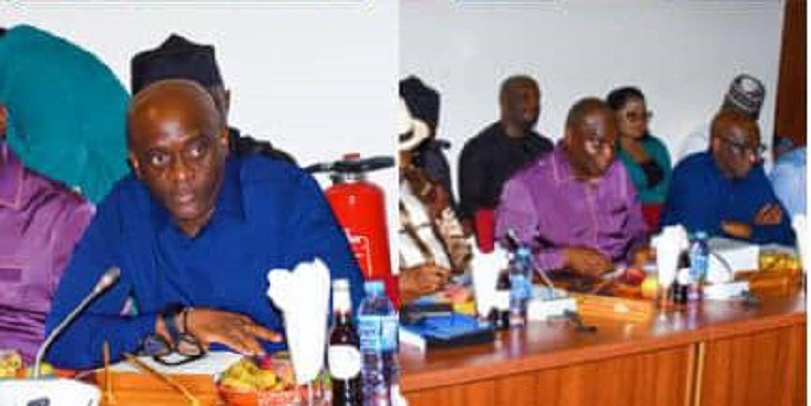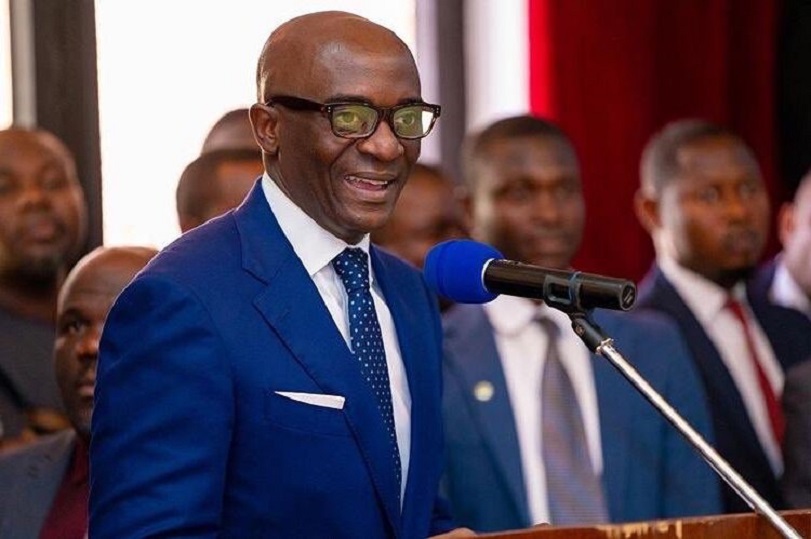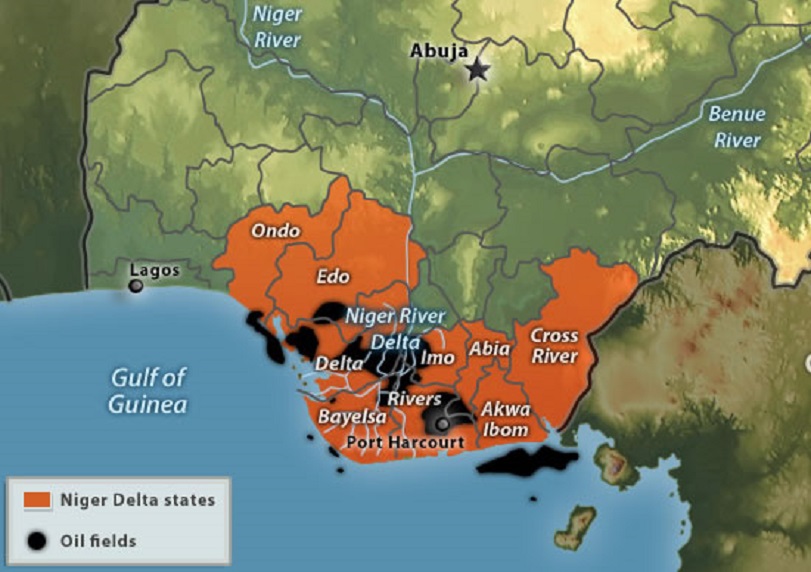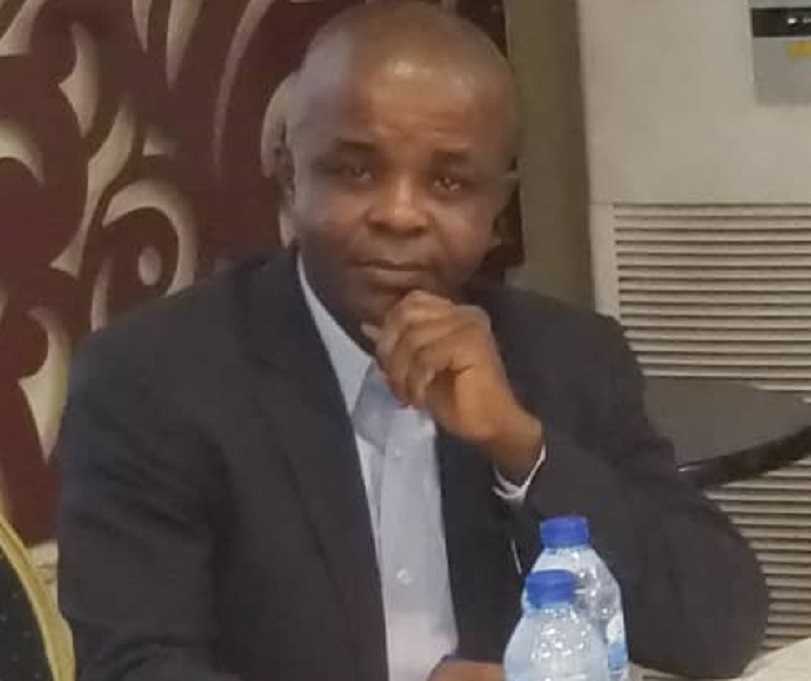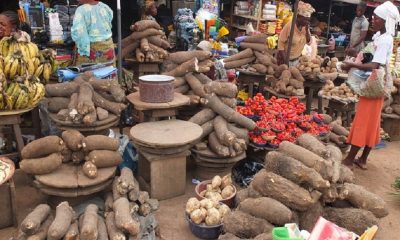Feature/OPED
Youth Unemployment and Government Slanted Efforts
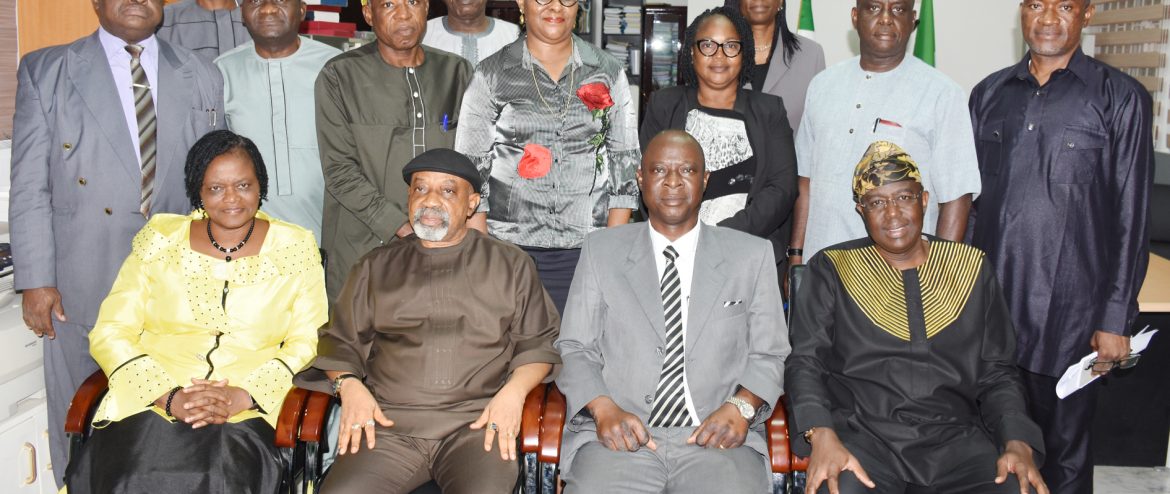
By Jerome-Mario Utomi
A peripheral look at the list of actions so far taken by the President Muhammadu Buhari led administration to quail the raging youth unemployment challenge in the country will flash a feel that all is well with the Nigerian youths in the areas of employment and economic wellbeing.
But contrary to this belief, the mind eyes of Nigerians upon objective assessment need not pause before disagreeing with the above assertion.
This particular contradiction becomes more evident when one looks at available reports/data from Nigerian Bureau of Statistics (NBS) which reveals that Nigeria’s second-quarter unemployment rate among young people (15-34 years old) was 34.9%, up from 29.7%, while the rate of underemployment for the same age group rose to 28.2% from 25.7% in Q3, 2018.
These rates, the report added, were the highest when compared to other age groupings. Nigeria’s youth population eligible to work is about 40 million out of which only 14.7 million are fully employed and another 11.2 million are unemployed.
To shed more light to the piece, recall that President Muhammadu Buhari had during a nationwide broadcast recently noted that this administration deeds and words have shown how committed they have been to the wellbeing and welfare of citizens, even with the steady dwindling revenues and the added responsibilities and restrictions due to the Coronavirus pandemic.
He noted that the government has put in place measures and initiatives principally targeted at youths, women and the most vulnerable groups in our society. These included broad plan to lift 100 million Nigerians out of poverty in the next 10 years; the creation of N75 billion National Youth Investment Fund to provide opportunities for youths and the Micro, Small and Medium Enterprises (MSME) Survival Fund, through which government is paying three months salaries of the staff of 100,000 MSMEs, paying for the registration of 250,000 businesses at the Corporate Affairs Commission (CAC), giving a grant of N30,000 to 100,000 artisans; and guaranteeing market for the products of traders. These are in addition to many other initiatives such as Farmermoni, Tradermoni, Marketmoni, N-Power, N-Tech and N-Agro.
This is apparently a well-prearranged effort. However, if this is the promised commitment to massive job creation for the army of young unemployed graduates in the country during the 2015 electioneering and the promised wellbeing, welfare of citizens, and broad plan to lift 100 million Nigerians out of poverty in the next 10 years, then it simply means that the present government is not willing to profit from the experience of its predecessor.
Hence, unlike evolution in nature, which prevents the present from repeating the mistakes made by the former, the nation is ‘condemned’ to hyper unemployment situation, youth-related and unemployment induced crisis. And most importantly, be ready to retain the world poverty capital title for a very long time. The reason for this assertion is not far-fetched.
Aside from the fact that youth unemployment remains the most pernicious of all challenges confronting the country as a large army of unemployed youths often always becomes a security threat to the few that are employed, what is of greater concern to this piece is the warning by development practitioners that solution/programmes mentioned by Mr President were but a mere repetition of mistakes made by the previous administration under a different operational nomenclature.
They were particularly of the view that it is not right for state and federal governments of Nigeria to create agencies that dole money to Nigerian youths with the aim of eradicating poverty as such huge resources do not have economic value. Instead, such amount they argued should be channelled towards building industries and factories of production.
Such a claim is not without examples.
In 2013, YouWin, which stands for Youths Enterprise with innovation in Nigeria, was initiated by President Goodluck Ebele Jonathan led federal government to generate jobs by encouraging and supporting aspiring entrepreneurial youth in Nigeria financially to develop and execute business ideas that would lead to job creation. It was according to reports designed to generate between 80,000 and 110,000 new jobs for unemployed Nigerian Youths.
In the end, the scheme produced only 1,200 winners who were selected from a pool of over 24,000 participants. But today, most of the winners/beneficiaries are on the streets of major cities in Nigeria searching for Job. These are verifiable facts.
If such unpleasant incident occasioned by government’s failure to create enabling environment for small and medium scale industries to thrive could befall these youths that received between N2 million and N10 million in the programme, at a time when inflation was at single digit, when electricity bill has not skyrocketed and fuel pump price was still at N97 per litre, then we can imagine what might happen now.
This piece, therefore, wonders what sort of good N10,000 Market Moni or Trader Moni, by the present administration, will do to a small business centre operator along Demurin Road, Alapere Ketu, Lagos, when petrol pump price is presently at N162 per litre, when he pays as high as N28,000 monthly Electricity Tariff, buys N20,000 worth of petrol to fuel his generating set and pays N10,000 as rent all in one month?
In the same vein, Nigerians are still waiting with a mouthful of air to see how payment for the registration of 250,000 businesses at the CAC will translate to, or help new business owners survive under the prevailing electricity and pump price hikes and in a nation lacking in economic strategies and appropriate support policy to the real sector?
Also rings apprehension is the reality that the policies mentioned above by Mr President lacks a clear definition of the present problem and because they are laced with virtually no sustainable consideration for connecting the youths with secured and enduring future, such interventions in the estimation of this piece become mere palliatives that cure effects while leaving the root cause to thrive.
From the above realities, it is obvious that President Muhammadu Buhari urgently needs to give up the excuses and justifications and come to terms with the results his administration is currently producing.
He must in the words of Jack Canfield underline that the only things that will change the result is to change behaviour. This administration needs to prospect more, but must be willing to look at the results of his administration producing. The only starting point that works is reality.
Specifically, Mr President needs to start looking around at people. Are they happy? Is there a balance? Do the systems work? Are they getting what they want? Is your reputation as president increasing? What about your grades? Are they satisfactory? Are you getting better in all areas of your leadership? If not, then something needs to happen, and only you can make it happen. Be ruthlessly honest with yourself. Take your own inventory.
Finally, it is not impossible that the present administration may have a sincere desire to move the nation forward but the truth remains that considering the slow-growing economy but scary unemployment levels in the country, the current administration will continue to find it faced with difficulty accelerating the economic life cycle of the nation until they contemplate industrialisation or productive collaboration with private organisations that have surplus capital to create employment.
Whichever way, this piece holds the opinion that it is still very possible to operate profitable businesses that will create millions of employment opportunities for our youths by the federal government using the Indian/Lebanese system of business model. Finding what this means and possibly domesticate the same should be the urgent responsibility of this government.
Jerome-Mario Utomi is the Programme Coordinator (Media and Public Policy), Social and Economic Justice Advocacy (SEJA), Lagos.
Feature/OPED
What If the Problem Isn’t Just the Government?

By Blaise Udunze
Recent reports in the media space highlighting threats of “naked protests” by market women across several states if the federal government fails to address the issue of hardship underscore the depth of hunger and poverty gripping the nation. No doubt, there is hardship in the country, of which Nigeria’s poverty crisis is often framed as the government’s failure, poor policies, weak institutions, corruption, and economic mismanagement.
From a balanced viewpoint, while these factors are undeniable, they do not tell the full story in its totality. The reality is that the majority of Nigerians, being the larger populace experiencing this challenge, will definitely oppose the ideology that poverty in Nigeria is not merely a policy problem; it is also a societal one. The underlying truth is that this is shaped by citizens’ behaviours, choices, cultural norms, and civic attitudes. This will remain a lived experience of the people until this dimension is confronted honestly; reforms will continue to yield limited results.
Nigeria’s economy has witnessed growth as inflation has decelerated, with headline inflation easing to 15.15percent and food inflation retreating to 10.84 per cent. The exchange rate was stabilising, and foreign reserves ($46.7 billion) had climbed to a seven-year peak. Despite the growth figures and ambitious government targets, millions of Nigerians remain trapped in poverty. More alarming is the recent estimates suggesting that an additional two million people could fall below the poverty line this year alone.
The intrigue is that the geographic distribution of these figures tells a deeper story, and this is more revealing than the numbers; however, there is an uneven geographical spread. Of concern here, which is troubling, is why states such as Yobe, Jigawa, Katsina, Kano, and Zamfara tend to experience or be deep in poverty when compared to other states like Lagos, Port Harcourt, Aba, Enugu, and Onitsha, which are projected to experience less poverty. This disparity raises a critical question, which calls for an urgent answer to why poverty outcomes differ so starkly within the same country, because no doubt, much of the explanation lies beyond government failures.
While governance challenges exist nationwide, the explanation extends beyond Abuja. Perhaps this is from deliberate ignorance of the people; the reality is that it lies in education, cultural practices, social norms, and individual responsibility play decisive roles in shaping economic outcomes.
One key alarming fact that has deeply entrenched poverty in many northern states, unlike other regions, is limited access to education, especially for girls, early marriage, polygamy, and large family sizes. There have been several factors that reinforce cycles of poverty by stretching limited household resources, reducing educational attainment, and limiting economic mobility, and this will continue to be a long-standing challenge or lived experience for the people if not addressed.
It is clearer that practical comparison illustrates this reality. Taking into consideration that a low-income worker in Yobe who marries four wives and raises over twenty children will inevitably struggle to provide adequate education, healthcare, and opportunities for his family, while in contrast, a similar worker in Aba is more likely to marry later, have fewer children, and invest in their education. Without much ado, over time, the children in the latter household acquire skills, productivity, and economic relevance because their parents chose to prioritise education for them, while the former remain trapped in subsistence and dependency. These differences are not subjective; they are structural and measurable.
Religion and culture further complicate the picture as record has it that Nigeria is one of the most religious countries in the world, yet religiosity often serves personal aspirations, prosperity, miracles, or divine favour rather than reinforcing civic responsibility and social ethics. Today in Nigeria, political leaders frequently reinforce this distortion and moral narrative. Only recently, it was announced that public officials in Abuja celebrate marrying off multiple children at once, some governors borrow billions to spend public funds on religious pilgrimages, while underfunding education, healthcare, and infrastructure, they send a clear message about priorities. In contrast, states that invest deliberately in education, such as Enugu with its smart school initiatives, demonstrate how leadership choices influence societal outcomes.
Still, the crisis of responsibility is not confined to any region. It is national, as proved during the discussions at Lagos State’s 12th Summit of the Association of Retired Heads of Service and Permanent Secretaries (ALARHOSPS), it was emphasised that societal progress depends not only on leadership but on citizenship behaviour. According to Professor Wusu Onipede, citizenship is defined by commitment to collective welfare, not mere residence.
The truth is not far-fetched, going by the saying that actions, positive or negative, directly impact society. What would have informed the common actions, such as stealing public assets, vandalising infrastructure, ignoring traffic laws, or tolerating corruption, all accumulate into widespread societal harm as seen in our everyday lives. Conversely, volunteering, mentorship, and community engagement generate resilience, opportunity, and shared prosperity. With close reading, one will notice that this dynamic was captured succinctly in Professor Oluwatomi Alade’s “Triangle for Change,” which pointed to the home, the school, and the community. Parents must brace up to understand that the primary responsibility is upon them to start prioritising education, teachers who impart both knowledge and character, and communities that uphold civic values create the foundation for sustainable development because the truth is that the change does not only rest on the government. In the same manner, it will be said that neglect in any of these spheres, whether through early marriage, disregard for schooling, or normalisation of polygamy, undermines national progress.
Religious institutions, as Professor Oguntola-Laguda argues, must also evolve, which means that beyond spiritual teachings, they should emphasise practical social ethics in the areas of responsibility, productivity, gender inclusion, and civic duty. In regions where harmful norms persist, faith leaders, traditional authorities, and elders possess the influence necessary to drive change, if they choose not to use it, otherwise the society will remain impoverished.
Globally, the link between social norms and poverty is well established, and norms that condone child marriage, gender exclusion, or unchecked family sizes perpetuate intergenerational deprivation. Over the period, in other countries, it is clear that economic interventions alone cannot dismantle these patterns because countries like India show that combining education incentives, political inclusion, and social protection can reduce poverty among marginalised groups. Initiatives such as Uganda’s SASA, which is a program that demonstrates that shifting attitudes toward gender and empowerment lead to improved economic outcomes. Nigeria’s poverty strategy must similarly integrate social transformation with economic reform.
None of this absolves government responsibility. Poorly sequenced reforms, rising taxes, insecurity, weak infrastructure, and inadequate social protection continue to deepen hardship. Senator David Mark of the African Democratic Congress has criticised what he terms “vicious policies” that worsen citizens’ vulnerability. Nigerians are acutely aware of these failures. What they demand is not statistics or political rhetoric, but practical policies that reduce hardship, enable productivity, and promote inclusion.
Even at this, Nigerians must take into cognisance that government action alone is insufficient. Poverty cannot be eradicated where large families are unsustainable, education is undervalued, and corruption is tolerated at the household and community levels. Individual responsibility remains the missing link. Citizens must be discreet in their timing for marriage until they can provide adequately, manage family sizes responsibly, educate all children, especially girls and reject the glorification of excess and impunity.
Insecurity further illustrates this shared responsibility. Though one will argue that the state bears the constitutional duty to protect lives and property, law and order, what about the dwellers? Communities must actively support security efforts through vigilance, information sharing, and conflict resolution. Silence in the face of crime and corruption enables disorder because independence loses meaning when citizens disengage from safeguarding their own communities.
Another critical aspect that is akin to insecurity is that economic development also falters when citizens undermine progress through dishonesty, rent-seeking, and apathy. What people fail to understand is that entrepreneurship, accountability, and cooperation are as vital as government-led job creation. The same thing can be said of cooperatives, vocational training, and local enterprise, which can deliver immediate relief and long-term sustainability. Wealthier Nigerians must focus on genuine social investment, creating opportunities, supporting education, and building institutions that outlast personal interest or individual generosity, rather than charity or wasteful spending or fueling crimes. Social responsibility must become a social norm.
One laughable misconception people harbour about independence, which must be clarified, is that it is not simply freedom from colonial rule; it is the presence of civic responsibility. It must be understood that poverty persists not only because of policy gaps but because of harmful norms, cultural practices, and neglected duties. Anyone can argue this, but the truth is that there will always be a replay of this menace kicked against because every child denied education, every early marriage, every act of corruption, reinforces the cycle.
Breaking this repeating problem, known as poverty, takes several coordinated strategies working together, not just one solution. There must be an understanding that the issues are complex and interconnected; they must be addressed from different angles at the same time. For these reasons, the government must provide stable policies, infrastructure, and social protection and the citizens, in like manner, must reform behaviours that perpetuate poverty. The same must be said of the families that must prioritise education, and also, the communities must reward civic engagement and innovation. Religious and cultural leaders must promote responsibility alongside faith because these are critical platforms that have the attention of the greater number of people. The policymakers at this juncture must ensure that policies not only deliver relief but also incentivise behaviours that support sustainable development.
Without too much argument, it is glaring that Nigeria’s potential is evident in states and communities that have embraced education, civic virtue, and social reform. Judging by the developments in different states, one will conclude that Lagos demonstrates how engagement and accountability improve outcomes, while Enugu shows that investing in children yields long-term dividends. Conversely, regions where harmful norms persist remain trapped, regardless of federal spending.
Without much ado, all Nigerian stakeholders must come to the terms that Nigeria’s poverty challenge cannot be reduced to government failure alone. It is a collective problem rooted in culture, norms, and personal choices because sustainable development demands both accountable leadership and responsible citizenship. The fact remains that poverty will remain an enduring shadow, irrespective of the repeated threats of “naked protests,” but until Nigerians fully embrace their role as architects, not just beneficiaries of national progress. True independence begins when citizens accept that the future of the nation rests as much in their daily choices as in public policy.
Blaise, a journalist and PR professional, writes from Lagos and can be reached via: [email protected]
Feature/OPED
AU Must Reform into an Institution Africa Needs

By Mike Omuodo
From an online post, a commentator asked an intriguing question: “If the African Union (AU) cannot create a single currency, a unified military, or a common passport, then what exactly is this union about?”.
The comment section went wild, with some commentators saying that AU no longer serves the interest of the African people, but rather the interests of the West and individual nations with greedy interests in Africa’s resources. Some even said jokingly that it should be renamed “Western Union”.
But seriously, how has a country like France managed to maintain an economic leverage over 14 African states through its CFA Franc system, yet the continent is unable to create its own single currency regime? Why does the continent seem to be comfortable with global powers establishing their military bases throughout its territories yet doesn’t seem interested in establishing its own unified military? Why does the idea of an open borders freak out our leaders, driving them to hide under sovereignty?
These questions interrogate AU’s relevance in the ensuing geopolitics. No doubt, the AU is still relevant as it still speaks on behalf of Africa on global platforms as a symbol of the continent’s unity. But the unease surrounding it is justified because symbolism is no longer enough.
In a continent grappling with persistent conflict, economic fragmentation, and democratic reversals, institutions are judged not by their presence, but by their impact.
From the chat, and several other discussion groups on social media, most Africans are unhappy with the performance of the African Union so far. To many, the organization is out of touch with reality and they are now calling for an immediate reset.
To them, AU is a club of cabals, whose main achievements have been safeguarding fellow felons.
One commentator said, “AU’s main job is to congratulate dictators who kill their citizens to retain power through rigged elections.” Another said, “AU is a bunch of atrophied rulers dancing on the graves of their citizens, looting resources from their people to stash in foreign countries.”
These views may sound harsh, but are a good measure of how people perceive the organization across the continent.
Blurring vision
The African Union, which was established in July 2002 to succeed the OAU, was born out of an ambitious vision of uniting the continent toward self-reliance by driving economic Integration, enhancing peace and security, prompting good governance and, representing the continent on the global stage – following the end of colonialism.
Over time, however, the gap between this vision and the reality on the ground has widened. AU appears helpless to address the growing conflicts across the continent – from unrelenting coups to shambolic elections to external aggression.
This chronic weakness has slowly eroded public confidence in the organization and as such, AU is being seen as a forum for speeches rather than solutions – just as one commentator puts it, “AU has turned into a farce talk shop that cannot back or bite.”
Call for a new body
The general feeling on the ground is that AU is stagnant and has nothing much to show for the 60+ years of its existence (from the times of OAU). It’s also viewed as toothless and subservient to the whims of its ‘masters’. Some commentators even called for its dissolution and the formation of a new body that would serve the interests of the continent and its people.
This sounds like a no-confidence vote. To regain favour and remain a force for continental good, AU must undertake critical reforms, enhance accountability, and show political courage as a matter of urgency. Without these, it may endure in form while fading in substance.
The question is not whether Africa needs the AU, but whether the AU is willing and ready to become the institution Africa needs – one that is bold enough to initiate a daring move towards a common market, a single currency, a unified military, and a common passport regime. It is possible!
Mr Omuodo is a pan-African Public Relations and Communications expert based in Nairobi, Kenya. He can be reached on [email protected]
Feature/OPED
Recapitalisation: Silent Layoffs, Infrastructure Deficit Threat to $1trn Economy

By Blaise Udunze
The Central Bank of Nigeria’s recapitalisation exercise, which is scheduled for a March 31, 2026, deadline, has continued to reignite optimism across financial markets and is designed to build stronger, more resilient banks capable of financing a $1 trillion economy. With the ongoing exercise, the industry has been witnessing bank valuations rising, investors are enthusiastic, and balance sheets are swelling. However, beneath these encouraging headline numbers, unbeknownst to many, or perhaps some troubling aspects that the industry players have chosen not to talk about, are the human cost of consolidation and the infrastructure deficit.
Recapitalisation often leads to mergers and acquisitions. Mergers, in turn, almost always lead to job rationalisation. In Nigeria’s case, this process is unfolding against an already fragile labour structure in the banking industry, one where casualisation has become the dominant employment model.
One alarming fact in the Nigerian banking sector is the age-old workforce structure raised by the Association of Senior Staff of Banks, Insurance and Financial Institutions (ASSBIFI), which says that an estimated 60 percent of operational bank workers today are contract staff. This reality raises profound questions about the sustainability of Nigeria’s banking reforms and the credibility of its economic ambitions.
A $1 trillion economy cannot be built on insecure labour, shrinking institutional knowledge, and an overstretched financial workforce.
Recapitalisation and the Hidden Merger Trap
History is instructive. Referencing Nigeria’s 2004-2005 banking consolidation exercise, which reduced the number of banks from 89 to 25, and no doubt, it produced larger institutions, while it also triggered widespread job losses, branch closures, and a wave of outsourcing that permanently altered employment relations in the sector. The current recapitalisation push risks repeating that cycle, only this time within a far more complex economic environment marked by inflation, currency volatility, and rising unemployment.
Mergers promise efficiency, but efficiency often comes at the expense of people. Speaking of this, duplicate roles are eliminated, technology replaces frontline staff, and non-core functions are outsourced. The troubling part of it is that this is already a system reliant on contract labour; mergers could accelerate workforce instability, turning banks into balance-sheet-heavy institutions with shallow human capital depth.
ASSBIFI’s warning is therefore not a labour agitation; it is a macroeconomic red flag.
Casualisation as Structural Weakness, Not a Cost Strategy
It has been postulated by proponents of job casualisation that it is a cost-control mechanism necessary for competitiveness. Contrary to this argument, evidence increasingly shows that it is a false economy. In reaction to this, ASSBIFI President Olusoji Oluwole, who kicked against this structural weakness, asserted that excessive reliance on contract workers undermines job security, suppresses wages, limits access to benefits and blocks career progression while affirming that over time, this erodes morale, loyalty, and productivity.
More troubling are the systemic risks. Casualisation creates operational vulnerabilities, higher fraud exposure, weaker compliance culture, and lower institutional memory.
One of the banking regulators, the Nigeria Deposit Insurance Corporation (NDIC), has not desisted from repeatedly cautioning that excessive outsourcing and short-term staffing models increase security risks within banks. On the negative implications, when employees feel disposable, ethical commitment weakens, and reputational risk grows.
Banking is not a factory floor. It is a trust business. And trust does not thrive in insecurity.
Inside Outsourcing Web of Conflict of Interest
Beyond cost efficiency, Nigeria’s casualisation crisis is also fuelled by a deeper governance problem, conflicts of interest embedded within the outsourcing ecosystem.
In many cases, bank chief executives and executive directors are reported to own, control, or have beneficial interests in outsourcing companies that provide services to their own banks. Invariably, it is the same firms supplying contract staff, cleaners, security personnel, call-centre agents, and even IT support. Structurally, this arrangement allows senior executives to profit directly from the same outsourcing model that strips workers of job security and benefits.
The incentive is clear. Outsourcing enables banks to maintain lean payrolls, bypass strict labour protections associated with permanent employment, and reduce long-term obligations such as pensions and healthcare. But when those designing outsourcing strategies are also financially benefiting from them, the line between efficiency and exploitation disappears.
This model entrenches casualisation not as a temporary adjustment tool, but as a permanent business strategy, one that externalises social costs while internalising private gains.
Exploitation and Its Systemic Consequences
The human impact is severe because the contract staff employed through executive-linked outsourcing firms often face poor working conditions, low wages, limited or no health insurance, and zero job security, which is demotivating. Many perform the same functions as permanent staff but without benefits, voice, or career prospects.
ASSBIFI has warned that prolonged exposure to such insecurity leads to psychological stress, declining morale, and reduced productive life years. Studies on Nigeria’s banking sector confirm that casualisation weakens employee commitment and heightens anxiety, conditions that directly undermine service quality and operational integrity.
From a systemic standpoint, exploitation feeds fragility. High staff turnover erodes institutional memory. Disengaged workers weaken internal controls. Meanwhile, this should be a sector where trust, confidentiality, and compliance are paramount; this is a dangerous trade-off if it must be acknowledged for what it is.
Why Workforce Numbers Tell a Deeper Story
It is in record that as of 2025, Nigeria’s banking sector employs an estimated 90,500 workers, up from roughly 80,000 in 2021. The top five banks today, such as Zenith, Access Holdings, UBA, GTCO, and Stanbic IBTC, account for about 39,900 employees, reflecting moderate growth driven by digital expansion and regional operations.
At face value, truly, these figures suggest resilience. But when viewed alongside the 60 percent casualisation rate, they paint a different picture, revealing that employment growth is without employment quality. A workforce dominated by contract staff lacks the stability required to support long-term credit expansion, infrastructure financing, and industrial transformation.
This matters because banks are expected to be the engine room of Nigeria’s $1 trillion economy, funding roads, power plants, refineries, manufacturing hubs, and digital infrastructure. Weak labour foundations will eventually translate into weak execution capacity.
Nigeria’s Infrastructure Financing Contradiction
Nigeria’s infrastructure deficit is estimated in the hundreds of billions of dollars. Power, transport, housing, and broadband require long-term financing structures, sophisticated risk management, and deep sectoral expertise. Yet recapitalisation-induced mergers often lead to talent loss in precisely these areas.
As banks consolidate, specialist teams are downsized, project finance units are merged, and experienced professionals exit the system, either voluntarily or through redundancy. Casual staff, by design, are rarely trained for complex, long-term infrastructure deals. The result is a contradiction, revealing that larger banks have bigger capital bases but thinner technical capacity.
Without deliberate workforce protection and skills development, recapitalisation may produce banks that are too big to fail, but too hollow to build.
South Africa Offers a Useful Contrast
South Africa offers a revealing counterpoint. As of 2025, the country’s “big five” banks, such as Standard Bank, FNB, ABSA, Nedbank, and Capitec, employ approximately 136,600 workers within South Africa and about 184,000 globally. This is significantly higher than Nigeria’s banking workforce, despite South Africa having a smaller population.
More importantly, South African banks maintain a far higher proportion of permanent staff. While outsourcing exists, core banking operations remain firmly institutionalized compared to the Nigerian banking system. For this reason, South Africa’s career progression pathways are clearer, labour regulations are more robustly enforced, and unions play a more structured role in workforce negotiations.
The result is evident in outcomes. South Africa’s top six banks are collectively valued at over $70 billion, with Standard Bank alone boasting a market capitalisation of approximately $30 billion and total assets nearing $192 billion. Nigeria’s top 10 banks, by contrast, held combined assets of about $142 billion as of early 2025, even with a much larger population and economy, and its 13 listed banks reached a combined market capitalisation of about N17 trillion ($11.76 billion at an exchange rate of N1,445) in 2026.
Though this gap is not just about capital. It is about institutional depth, workforce stability, and governance maturity.
Bigger Valuations, But a Weaker Foundations?
Nigeria’s 13 listed banks reached a combined market capitalisation of about N17 trillion in 2026. It is no surprise, as it is buoyed by investor anticipation of recapitalisation and higher capital thresholds. Yet market value does not automatically translate into economic impact. Without parallel investment in people, systems, and long-term skills, valuation gains remain fragile.
South Africa’s experience shows that strong banks are built not only on capital adequacy, but on human capital adequacy. Skilled, secure workers are better risk managers, better innovators, and better custodians of public trust.
Labour Law and its Regulatory Blind Spots
ASSBIFI’s call for a review of Nigeria’s Labour Act is timely, and this is because the current framework lags modern employment realities, particularly in sectors like banking, where technology and outsourcing have blurred traditional employment lines. Regulatory silence has effectively legitimised casualisation as a default model rather than an exception.
The Central Bank of Nigeria cannot afford to treat workforce issues as outside its mandate. Prudential stability is inseparable from labour stability. Regulators must begin to view excessive casualisation as a risk factor, just like liquidity mismatches or weak capital quality.
Recapitalisation Without Inclusion Is Incomplete
If recapitalisation is to succeed, it must be inclusive; therefore, the industry must witness the enforcement of career path frameworks for contract staff, limiting the proportion of outsourced core banking roles, and aligning capital reforms with employment protection. It also means recognising that labour insecurity ultimately feeds systemic fragility.
South Africa’s banking sector did not avoid consolidation, but it managed it alongside workforce safeguards and institutional continuity. Nigeria must do the same or risk building banks that look strong on paper but crack under economic pressure.
True Measure of Reform
Judging by the past reform in 2004-2005, it has shown that Nigeria’s banking recapitalisation will be judged not by the size of balance sheets, but by the resilience of the institutions it produces. As part of the recapitalisation target for more resilient banks capable of financing a $1 trillion economy, it demands banks that can think long-term, absorb shocks, finance infrastructure, and uphold trust. None of these goals is compatible with a workforce trapped in perpetual insecurity.
Casualisation is no longer a labour issue; it is a national economic risk. If mergers proceed without deliberate workforce stabilisation, Nigeria may end up with fewer banks, fewer jobs, weaker institutions, and a slower path to prosperity.
The lesson from South Africa is clear, as it shows that strong banks are built by strong people. Until Nigeria’s banking reforms fully embrace that truth and the missing pieces are addressed, recapitalisation will remain an unfinished project. and the $1 trillion economy, an elusive promise.
Blaise, a journalist and PR professional, writes from Lagos, can be reached via: [email protected]
-

 Feature/OPED6 years ago
Feature/OPED6 years agoDavos was Different this year
-
Travel/Tourism9 years ago
Lagos Seals Western Lodge Hotel In Ikorodu
-

 Showbiz3 years ago
Showbiz3 years agoEstranged Lover Releases Videos of Empress Njamah Bathing
-

 Banking8 years ago
Banking8 years agoSort Codes of GTBank Branches in Nigeria
-

 Economy3 years ago
Economy3 years agoSubsidy Removal: CNG at N130 Per Litre Cheaper Than Petrol—IPMAN
-

 Banking3 years ago
Banking3 years agoSort Codes of UBA Branches in Nigeria
-

 Banking3 years ago
Banking3 years agoFirst Bank Announces Planned Downtime
-

 Sports3 years ago
Sports3 years agoHighest Paid Nigerian Footballer – How Much Do Nigerian Footballers Earn



